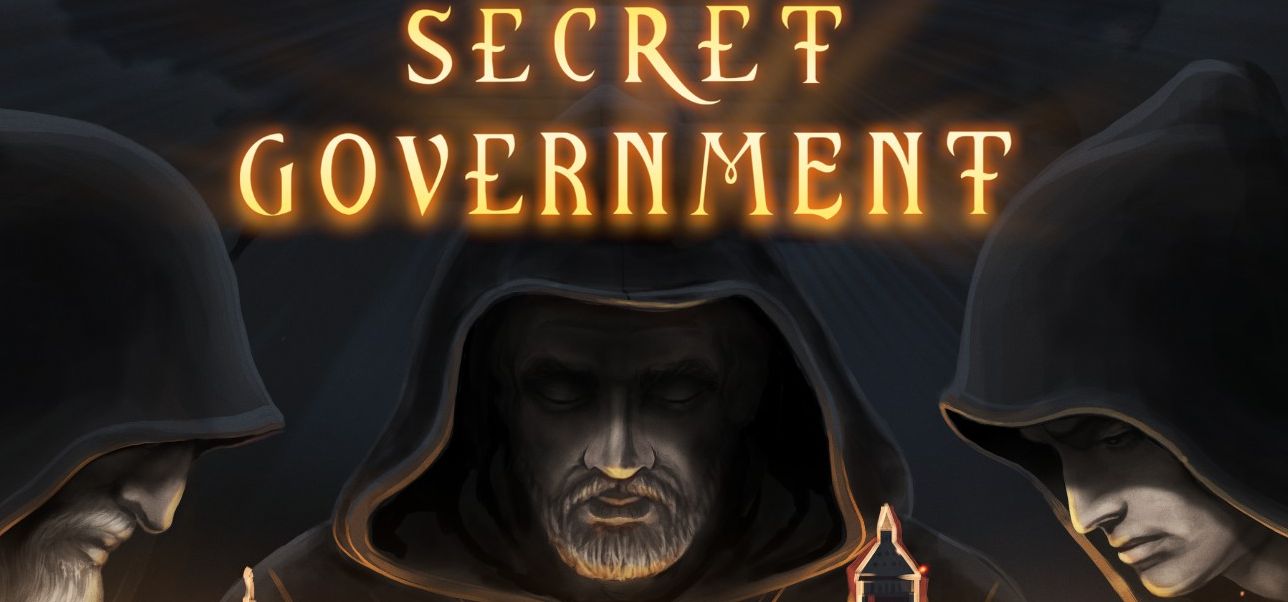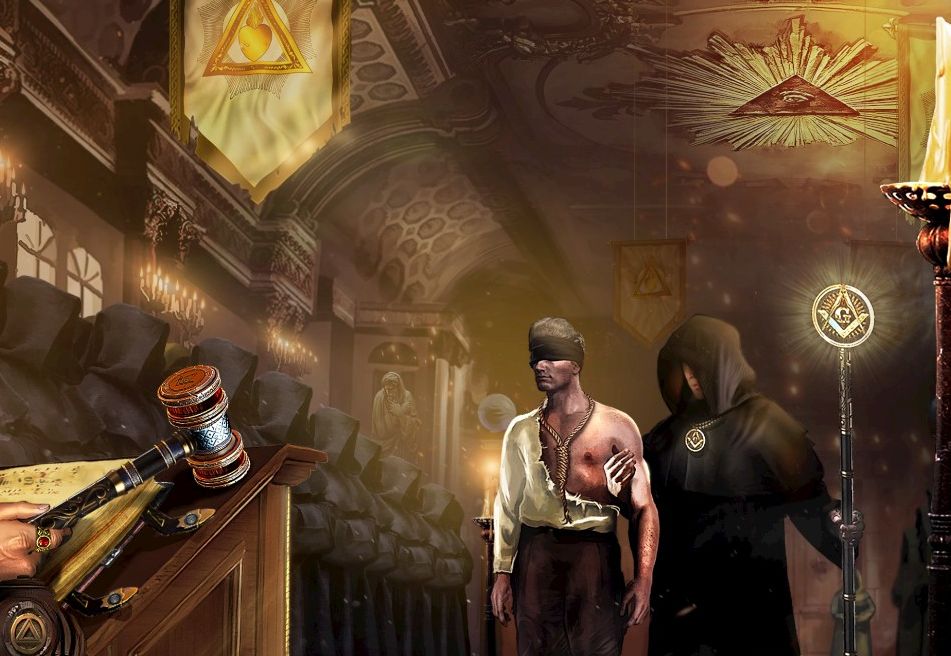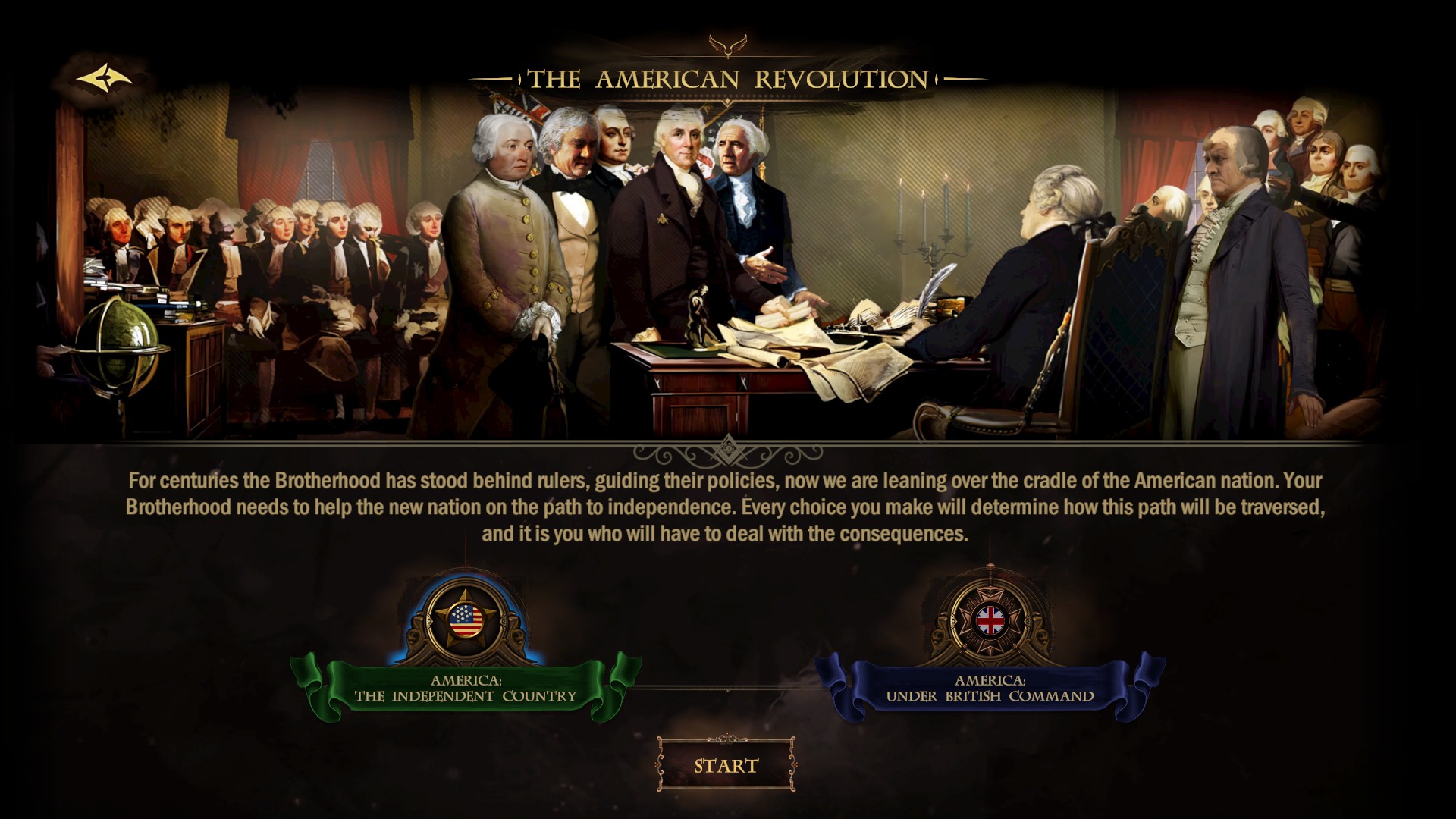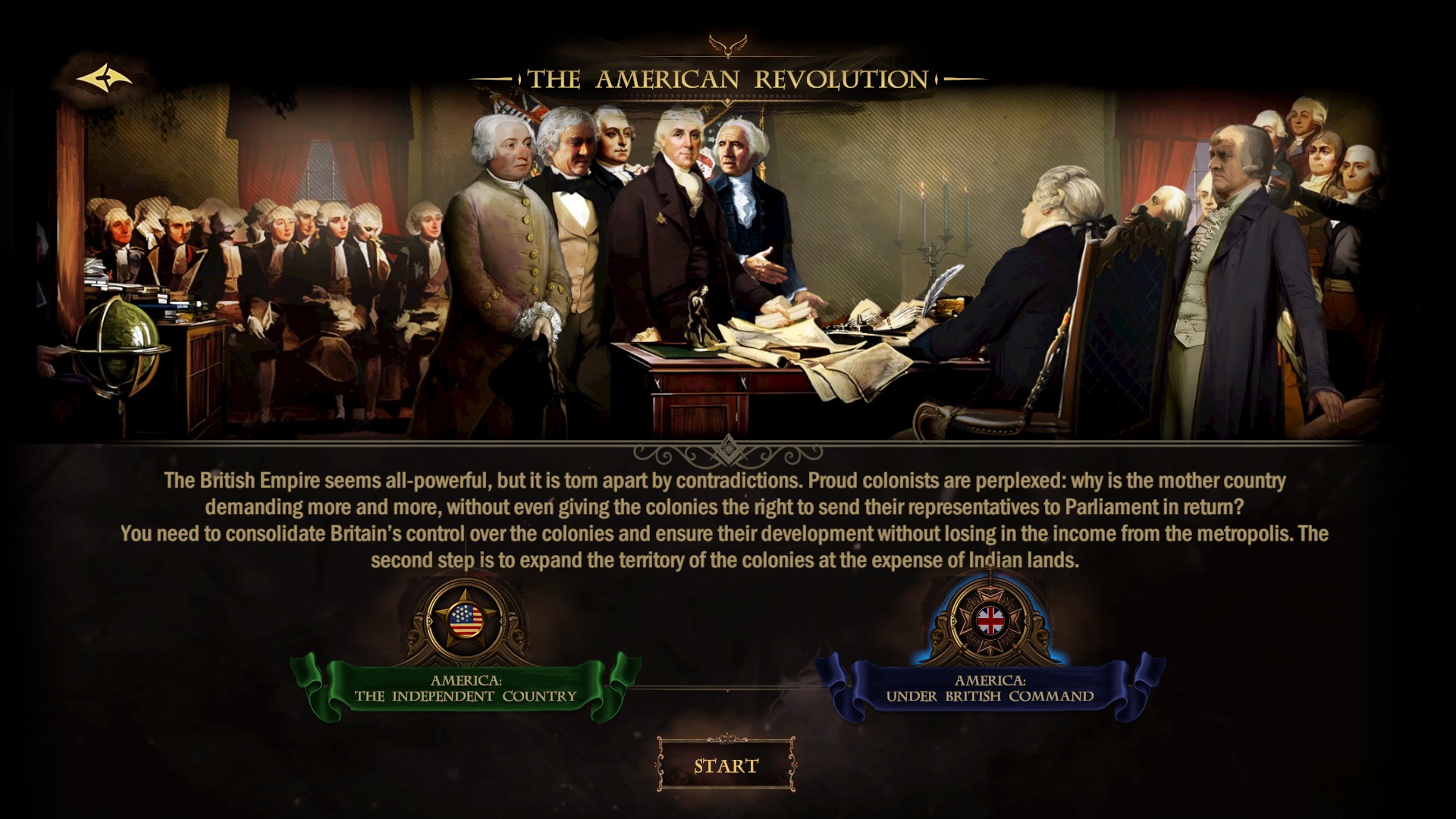Consult the stars and heed well the words of your elders in the Brotherhood to divine the eldritch lore necessary to operate the interface of this game.
Type: Single-player
Genre: Grand Strategy,
Historical Simulation
Developer: GameTrek
Publisher: 1C Entertainment
Release date: 22 Jun, 2020
Intro
Secret Government was released to Early Access on Steam June of 2020, with Fnord putting up his review in September. As of now at late January of 2021, the complete version of the game is stated to be expected in April of 2021, making this more of a progress report than a preview. Nevertheless, GameTrek seems keen on getting reviewers to give second or more looks at the game with every update (and undoubtedly will be asking for a release review).
Since Fnord’s review has gone up, there have been moderate interface changes and bugfixes, but the most immediately obvious change is the addition of the American Revolution campaign and an expansion of Freeplay Mode to include that time period and region of the world. If GameTrek keeps to its stated schedule (although I would expect delays as the content updates have been delayed and they will likely knock the final release back at least as much), then April will bring two more campaigns in the French Revolution and Napoleonic Wars, as well as significant advancements in the “estates” (social classes) having their own agendas and activities, and more “world ideas” mechanics, among others, while also revising the whole interface.
In Fnord’s review, he stated that this would be the sort of game that only appealed to certain types of people. I am almost certainly the core demographic of the type of person that should love this game the most, as I am primarily a strategy gamer, but find the more popular 4X and RTS genres to be somewhat boring in their directness, and vastly prefer games like Crusader Kings for their subtlety. That said, I largely agree with Fnord’s assessments of the game’s strengths and shortcomings that do not seem to have been fully patched in the four months since his review went up. As of this update, there are many complex mechanics under the hood of this game that seem to provide little to no actual gameplay function, while the main mechanics you use most often are far more blunt instruments than really befits the cloak-and-dagger theming this game strives to embody.
Real Secret Societies
I think it best to start off with a close-up of the main menu screen, because while GameTrek never actually states as much, with their symbolism, they don’t want to make it subtle exactly which secret society you are supposed to be…
Take a look at all the symbols that are blatantly highlighted, including the extremely prominent Square and Compass symbol, and it’s a dead giveaway that the secret society in question is the Freemasons. This goes especially well with the American Revolution campaign, on whose American currency you’ll recognize that “eye on a pyramid” Eye of Providence symbol. The man with exposed chest and noose around his neck is one of the initiation rituals. Even the titles of masters in the game, like “Worshipful Master” are Freemason titles. Freemasonry has had their secrets exposed many times over the years – you can look these things up.
Historically speaking, the Freemasons started out as actual masonry guilds during the Middle Ages, who were responsible for building structures such as castles, cathedrals, bridges, and any other building where someone was willing to pay to build it out of stone. Guilds of the Middle Ages were something between unions and small business bureaus in that they both negotiated on behalf of their workers and regulated who could perform certain forms of work and under what guidelines, relying upon the keeping of trade secrets to those who were members of the guild to prevent competition outside the guild itself.
The transition from a stonemason’s union that kept trade secrets to a Secret Society that fueled much paranoia about the extent of their government connections came about during the Enlightenment. When free thinkers were coming out with radical ideas like overthrowing the crown, they wanted to keep their naked sedition talk to places where people were bound to rules of secrecy so as to avoid the obvious charges of treason, and found the clannish guild setup a good camouflage as they were already well established and would not attract too much attention setting up a few more lodges. The various symbols, codes, and secret handshakes were added during this time both to ascertain membership before revealing something that might put them in legal jeopardy, and also to obfuscate their real political agendas behind a lot of mystical and religious iconography that would divert the attention of lay observers. The actual stonemasons, for their part, got the benefit of a bunch of famous rich guys throwing their money around to spruce up the joint and give their blue collar profession a lot more respectability in certain social circles.
It’s important to note that many of the revolutionaries, such as Benjamin Franklin who put that eye-on-a-pyramid sign on the US dollar, were not pawns of the Freemasons, but were Freemason, themselves. They were only a secret government during the planning stages of the revolution, after which point they weren’t so much the Secret Government as just The Government, and the secrecy was largely there to keep their political views from getting them the noose.
Secret Societies as Portrayed by This Game
Secret Government leans into the more conspiratorial rumors surrounding the Freemasons and other secret societies, because I suppose less sensationalist takes on the subject wouldn’t be as eye-catching, although I think the more realistic scope of just being backers of a political ideology that have to remain secret in lands where your ideology is unpopular would make for a better game. This means that the English Revolution tutorial campaign that Fnord talked about starts off with claims that the Freemasons being exposed were revealed in the writings of Nostradamus and such. The problem with the cackling megavillain “we control the true history of the world” take is that it tends to undermine the core gameplay angle that this is supposed to be about a secret struggle between ideologies vying for power during the time when the old order of absolute monarchies were starting to crumble before the first wave of democracy.
To explain why, let’s start with the English Revolution, because one of the first things in the tutorial showed me a major flaw in this game’s conceptualization of how secret societies control the government. You see, in the tutorial, they start you off telling you to persuade two members of the English government to join your society. The first has to be the finance minister, while the second can be anyone of your choosing… but when I noticed that the king of an absolute monarchy was a choice I could make and I had a +10,000% you-cannot-fail-because-it’s-the-tutorial bonus chance to success, I picked the King of England because why wouldn’t I?!
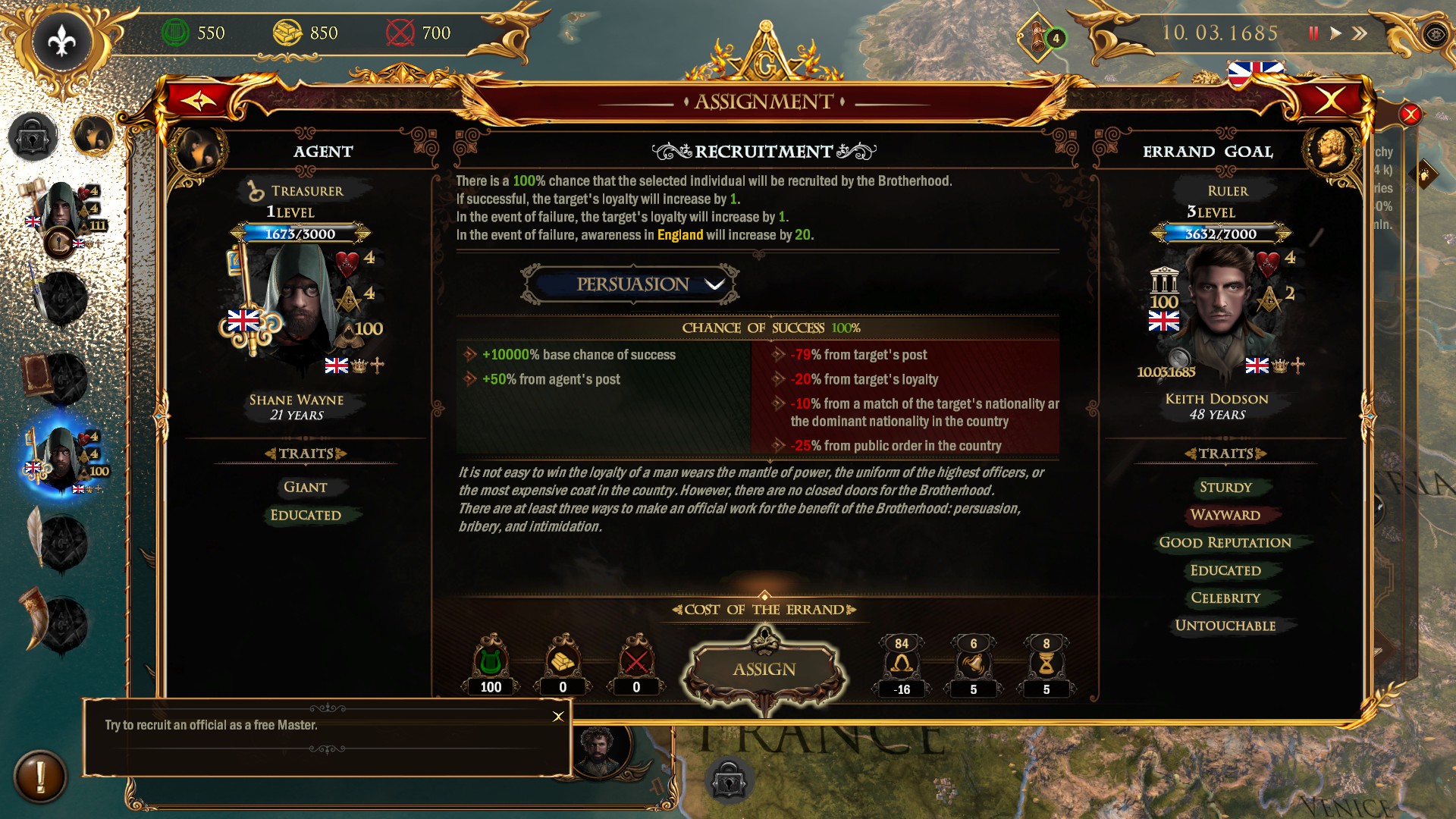
Over time in the game, you can use the king to start influencing other people in his government to join your Brotherhood. (Oh, and emphasis on the male, here, as women do not exist in this game’s world. I suppose that’s why nobody with the same last name inherits a position like king with the same last name in this game – humans reproduce through pods or something, I guess. This is a game that lets you set up a Communist Revolution that takes over all of Europe and the Americas, but giving women the franchise is not even considered.)
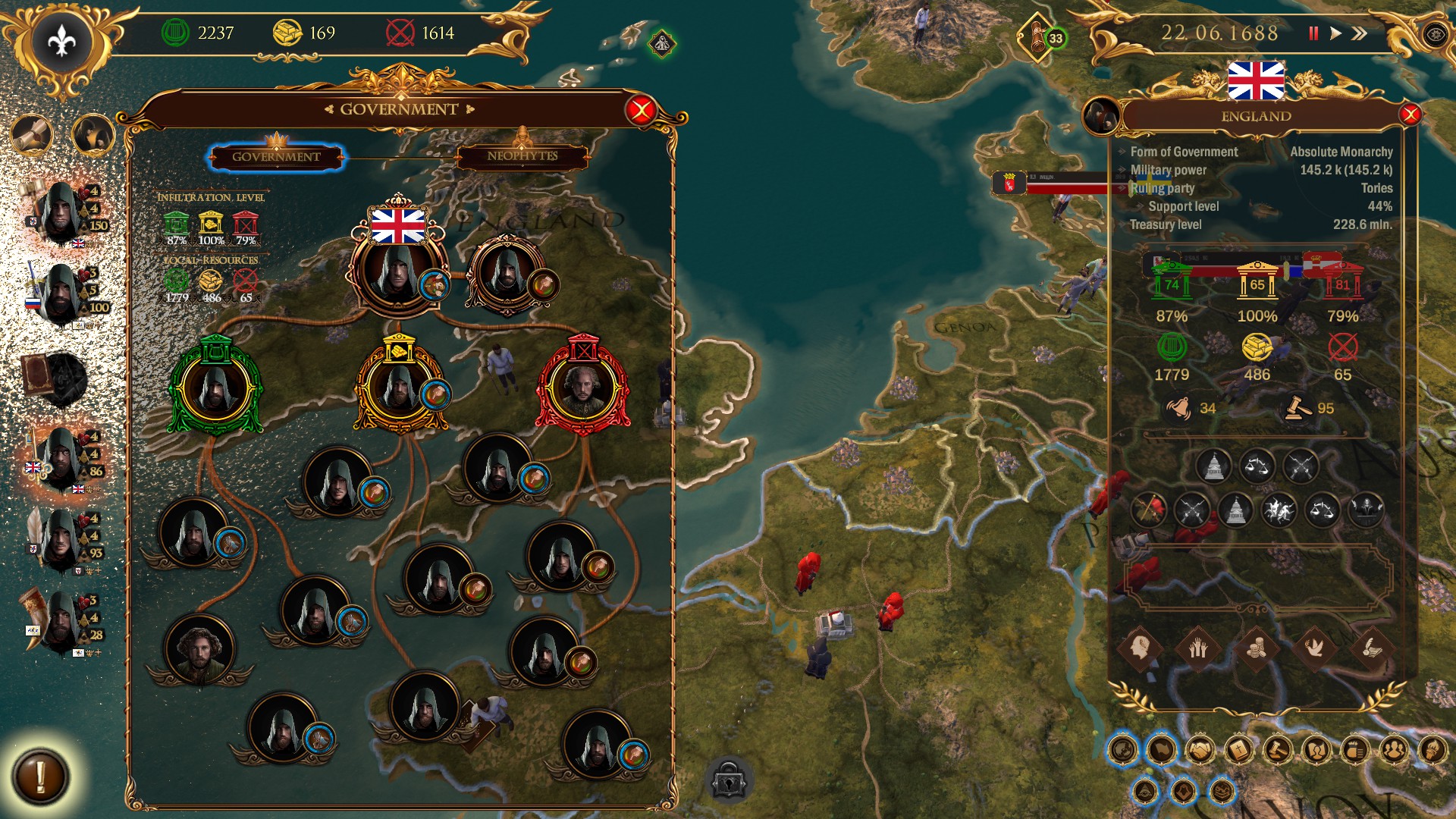
So as for why this is a problem in a game that’s supposed to be about subtle manipulation of nations from behind the scenes, just consider the difference between two possible approaches to the overarching goal you have of overthrowing the English monarchy in the Glorious Revolution campaign: You can either A) take advantage of the recent English Civil War killing off a King of England, and the resultant fractious relationship between the House of Lords and King of England over the question of Divine Right and absolute power as well as swirling conflicts over the rise of Protestantism in a country that still had a Catholic king to foment revolution from below (real history); or B) you can ask the king to join your secret society, then have him abdicate the throne when you tell him to do so. Which is the more intriguing story? Which is by far the easier to accomplish – and therefore the one the player will take – when you already have the king as part of your secret society?
The fundamental order of operations in Secret Government feels entirely off, as you basically have to start off with what should be your ultimate goal – ensuring that those in power are part of your society. You just ask them to join and have a percentage chance of success, and after that, you can have them start embezzling funds for your cause. This is your primary source of income, so you have to start with this as your first objective when moving into any nation for the first time. You cannot even engage with the more subtle aspects of the game, such as setting tax policy to aid or deliberately sabotage a nation without already having the finance minister as a member of your secret society. So rather than having a system where you start off with an egalitarian free market libertarian-style ideology and try to popularize it to start competing with the predominant royalist views before managing to get some members of your ideology into higher and higher posts where they can further spread their ideas, you start off getting royalists to join your club, then telling them to deliberately sabotage their own government so you can walk in and change it from the inside. It’s really putting the cart before the horse, and it ruins the subtler mechanics the game has running under the hood when so many of your goals are more easily accomplished with more direct “just get everyone on our side by persuading anyone we can, and compromising or assassinating those we can’t out of office until we find someone we can persuade to our side” method.
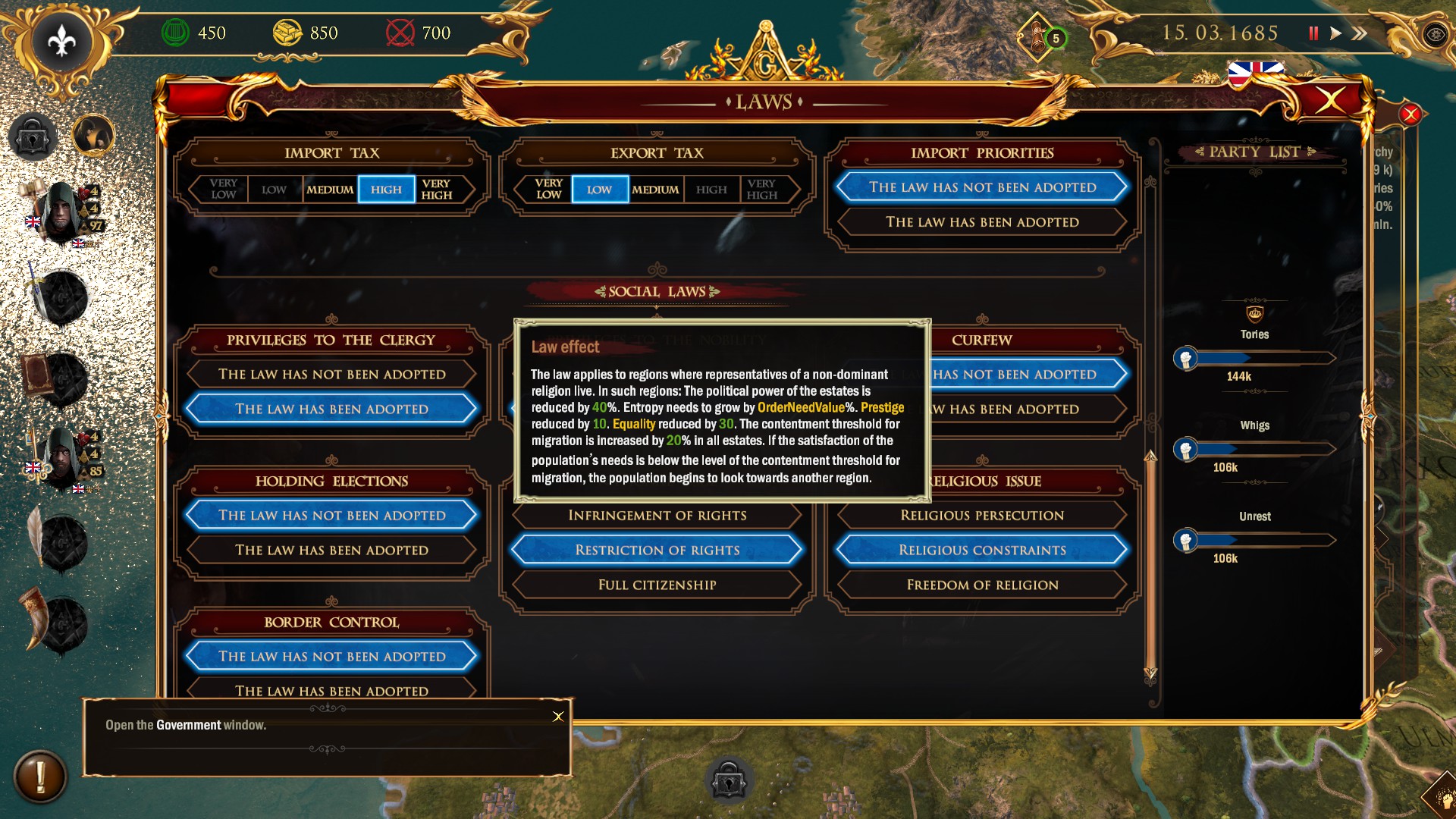
The game has various “missions” that require you to do some of the more subtle acts, anyway, but the game having to arbitrarily force you to use the more interesting mechanics in spite of easier, more direct mechanics doesn’t really let the game live up to the more clandestine concepts it plays with. If your goal in Freeplay Mode is to spread your ideology to half the map, which is an easier way of handling this – infiltrating every single government and converting their nation to your ideology, or converting the largest, most militarily powerful one or two nations, then having them declare war on everything until they own half the map? Remember – wars are just fought via size of army and economic strength, so massive empires like France and England can easily curb-stomp the map if they team up. Long-running geopolitical rivalries? The game lets you paper over those as soon as you convert enough members of government to your side.
This is because anyone who joins your brotherhood just takes orders with no will of their own. Even when the driving force of conflict in Europe for a campaign is religious rivalry, like in the Glorious Revolution campaign, being opposing religions is only a -10% chance to indoctrinate someone, and that can be mitigated by simply sending a Catholic out to do the persuading of a staunch Catholic loyalist king. Once part of your brotherhood, they will persecute their own Catholic side without complaint. There is a “loyalty” metric, but this only seemingly applies as a defense stat against conversion by enemy secret societies (and is a -10% chance per rank of loyalty, as well), so it rarely even comes up if you have managed to drive your rival secret societies out of a nation.
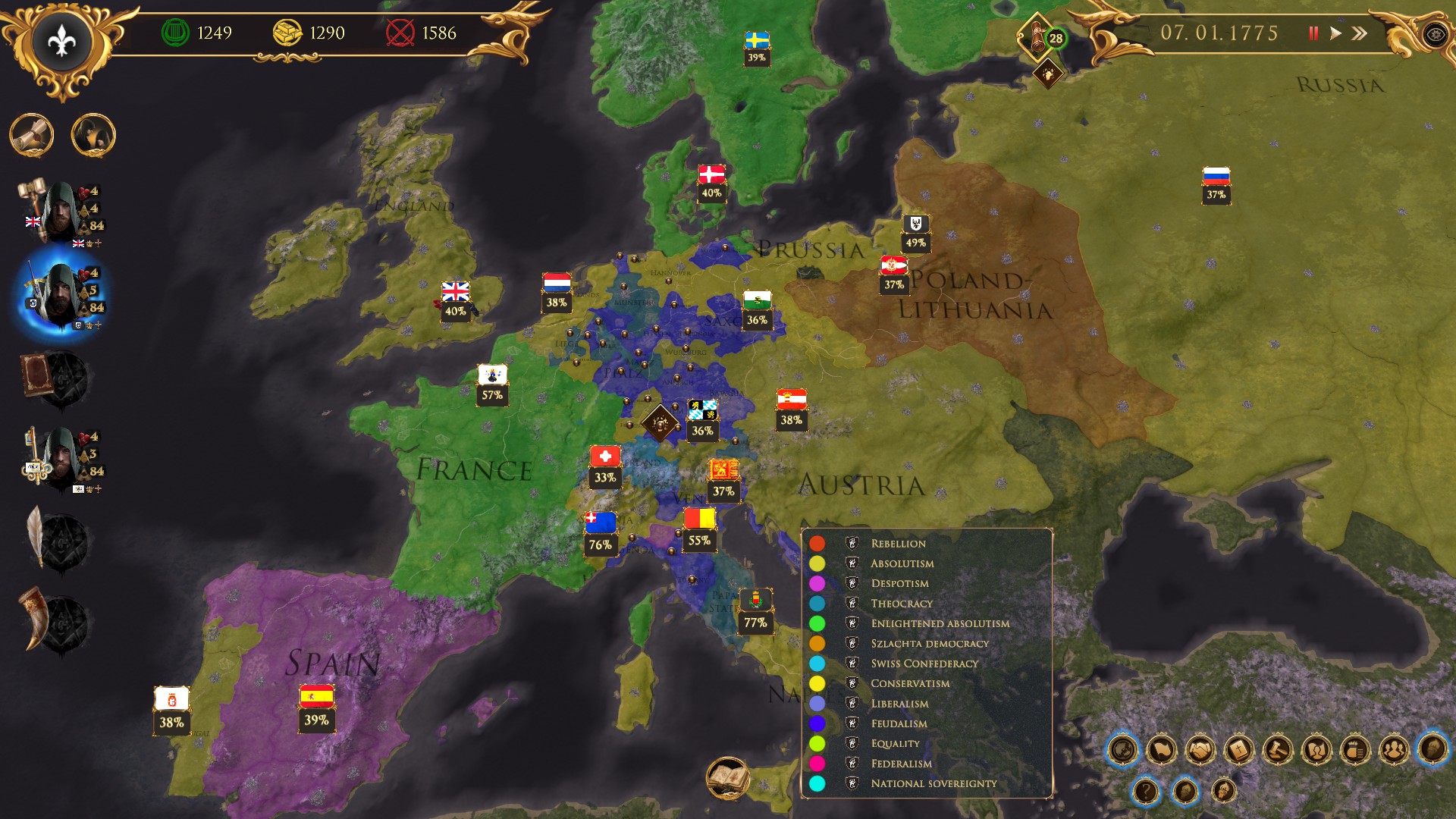
This also applies to the rival secret societies. Rather than combating their ideologies (which aren’t even revealed to you in most cases), you just fight their members directly by exposing them to lower their secrecy, then kidnapping them and either making them join your side or executing them until you gradually whittle their numbers down faster than they can replace them, all while having to dump resources into hiding from the world to restore your own agent’s secrecy. They, for their own part, do exactly the same things of getting government officials to join their side and exposing and kidnapping your own agents that you do. They’re a really mindless opposing force that exists just to kill you and which you just engage in direct (if clandestine) combat with, rather than supporting the more subtle aspects the game hints at wanting to be about of being, for example, a pro-Catholic force while your secret society is trying to spread Protestantism.
New Content
The most salient new content is the American Revolution campaign, and a new Freeplay Mode set in the same geographic region and timeframe.
You can play as either the American Revolution itself, or royalist opponents to the revolution, this time. Unlike the previous English Revolution campaign, which included the destruction of the Brotherhood and its rebuilding as a tutorial mode, the American Revolution just gives you three guys at a table asking you what your goals are going to be, and you’re off to the races.
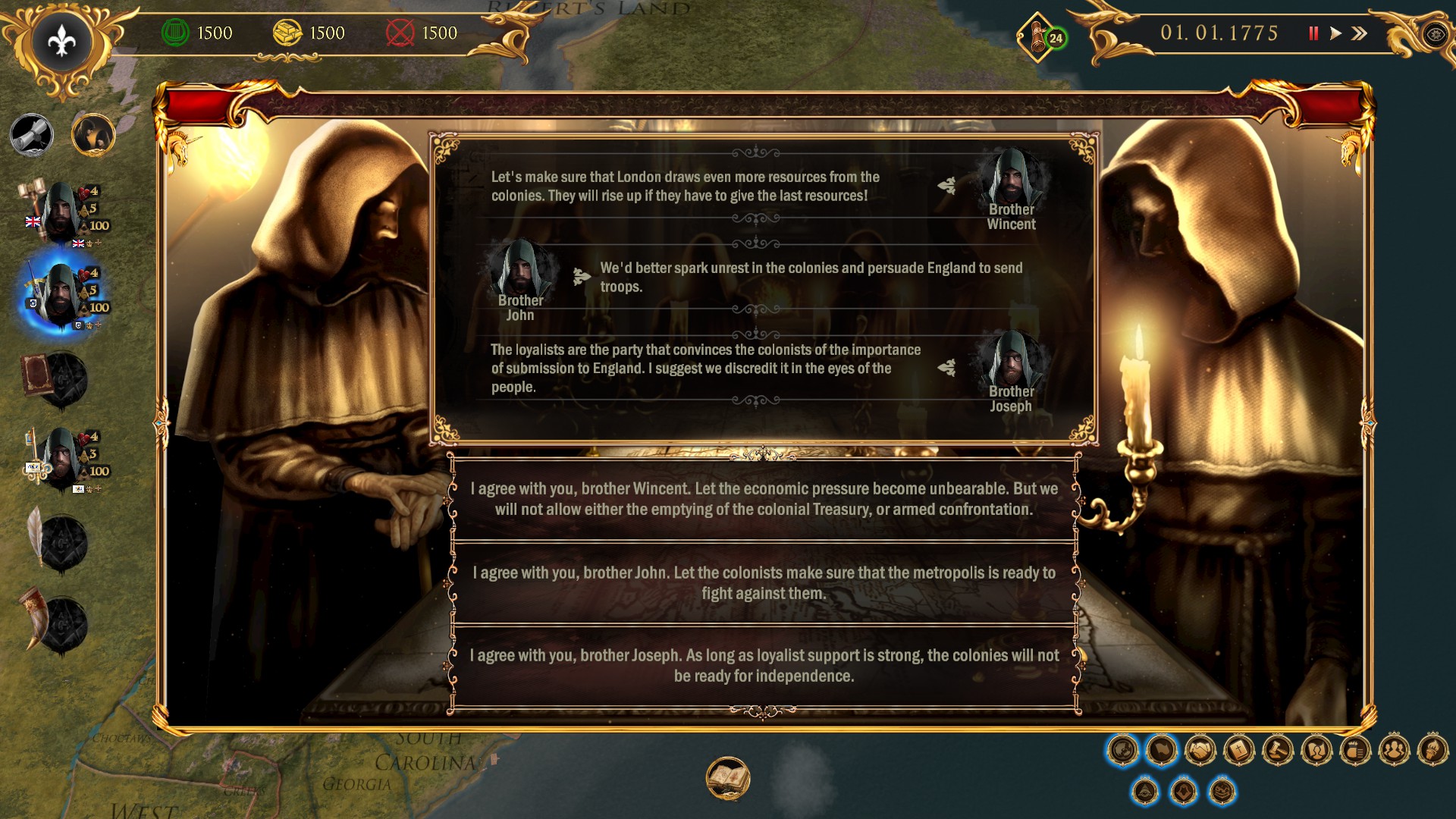
While this game has the map extended west for the Americas, it still contains most of Europe, although it notably lacks large chunks of Eastern Europe like Hungary, Greece, and the Balkans, presumably wanting to avoid dealing with the Ottomans and keeping religious conflicts confined to internecine Christian conflicts rather than involving Islam.
Unlike the Glorious Revolution campaign, you have unrestricted access to the interface from the start, at least so long as you have the right members of government to operate them as members of your society. I went between playing the American Revolution and the (tutorial mode) Glorious Revolution, and found it honestly easier to learn some things in the American Revolution, just because there was fewer parts of the game locked out, preventing me from using and learning those parts.
One of the things worth noting is that every colony is treated as its own nation, even as Ireland, Scotland and Wales are just part of England with no government of their own, and all of Mexico is one territory under Spanish Loyalist control. New York is oddly also the starting location of revolutionary lodge, rather than Massachusetts or Pennsylvania, which were much more directly involved in starting the revolution.
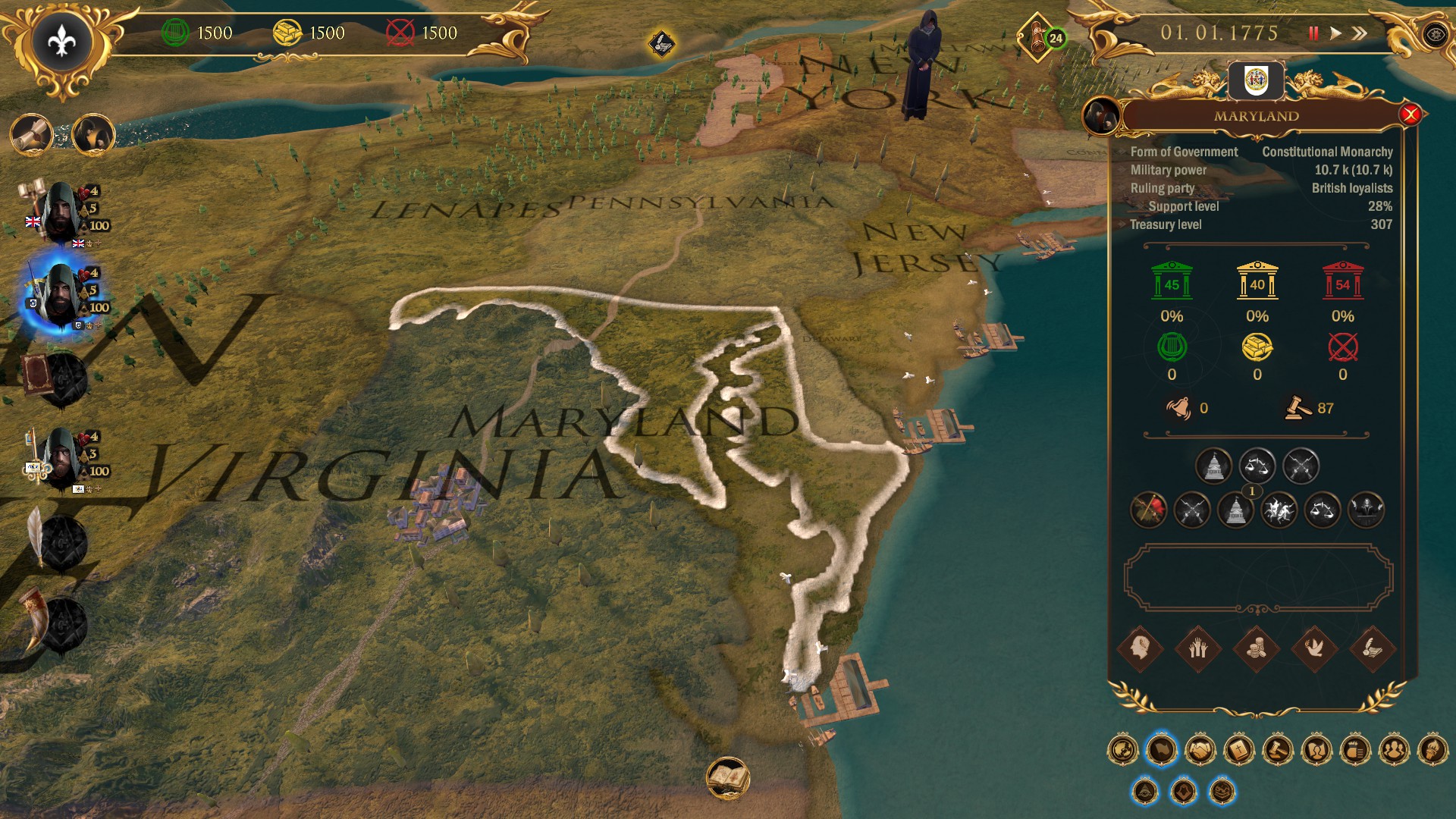
In a problem which is echoed in the Tutorial section, however, I had trouble understanding what, exactly, I was supposed to do. I chose to undermine British Loyalist support as a first step in my campaign towards revolution, for example, and while writing pamphlets against loyalists was a straightforward task, the other task given to me was “Support for the Troubles party must grow 20%”. The only problem with that is that there is no Troubles party. There is an option where you can create your own party (which also lets you pick your own ideology for that party you support, and is very cool), but there is no “Troubles” option you can pick there… I had to just guess that “Troubles” meant “Unrest”, and not some new party I could create (or my first thought being fomenting a Catholic separatist movement in Ireland, because that’s what “The Troubles” actually means).
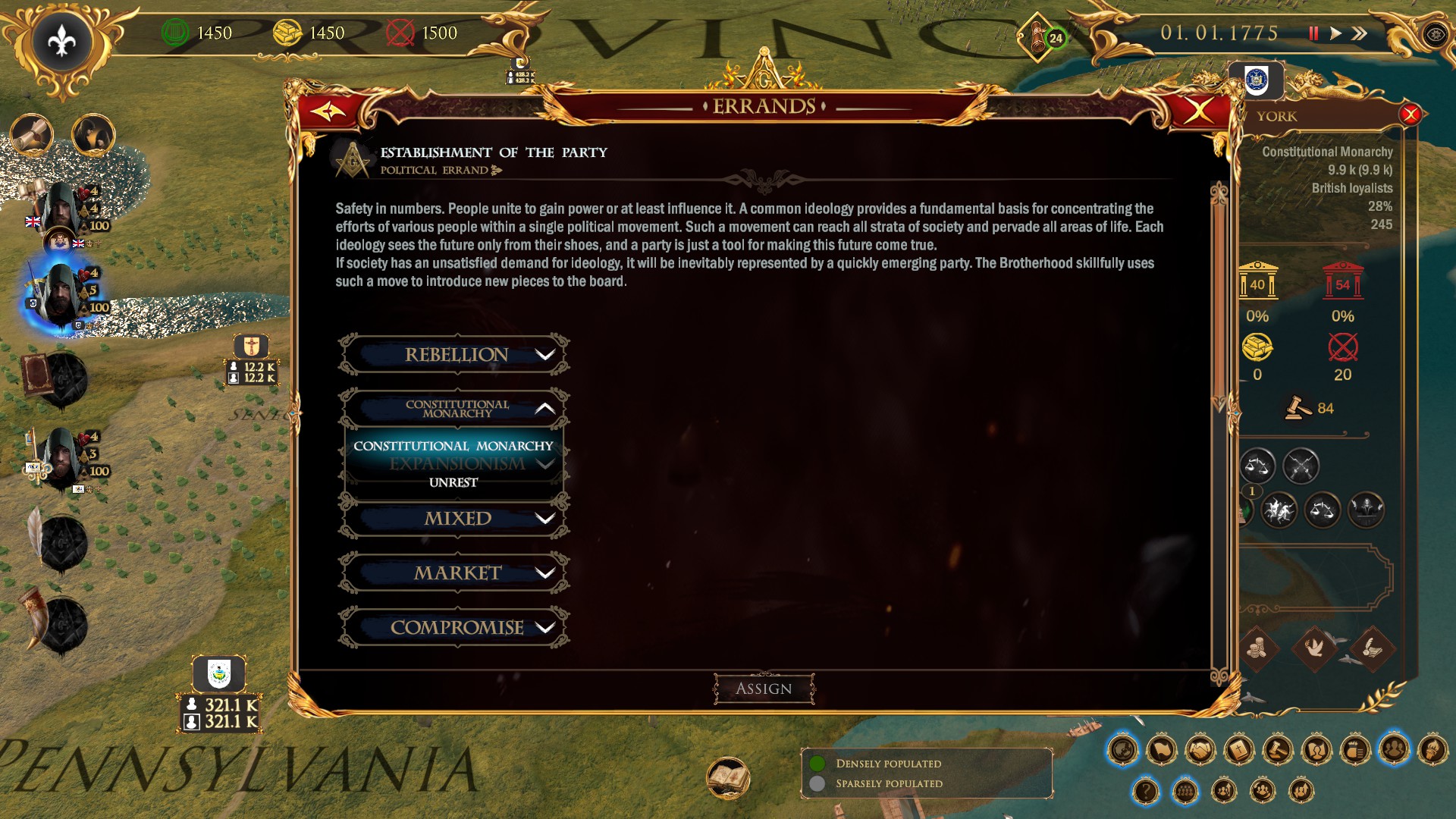
Lost in Translation
It’s here I have to mention that this game is made by a Russian developer that is just being translated into English, and this is where a lot of these troubles seem to arise. The translation is not consistent, and the connotations of many of the words are misleading to English speakers, making an already complex game unnecessarily confusing because the terms that are used are used inconsistently, or are not described at all in the interface.
One major example is that there are two separate sets of intelligence-gathering orders you can give out for gaining information on regular government officials (which you need to learn to know how to persuade, bribe, or blackmail them into working for you), and another set for fighting against rival secret societies. The “collect information” task, for example, is only used to gain information on rival secret societies, and the game will not allow you to use this command to gather information on normal government agents or when there aren’t already rival secret society agents already exposed to you. Instead, I need to go to the government page, click the guy I want to gain information on, and then… “collect information”. Yes, that’s right, they set up two different, mutually exclusive commands you give your minions as having the same name and icon, differentiated only by where in the interface you find it! Nothing confusing about that!
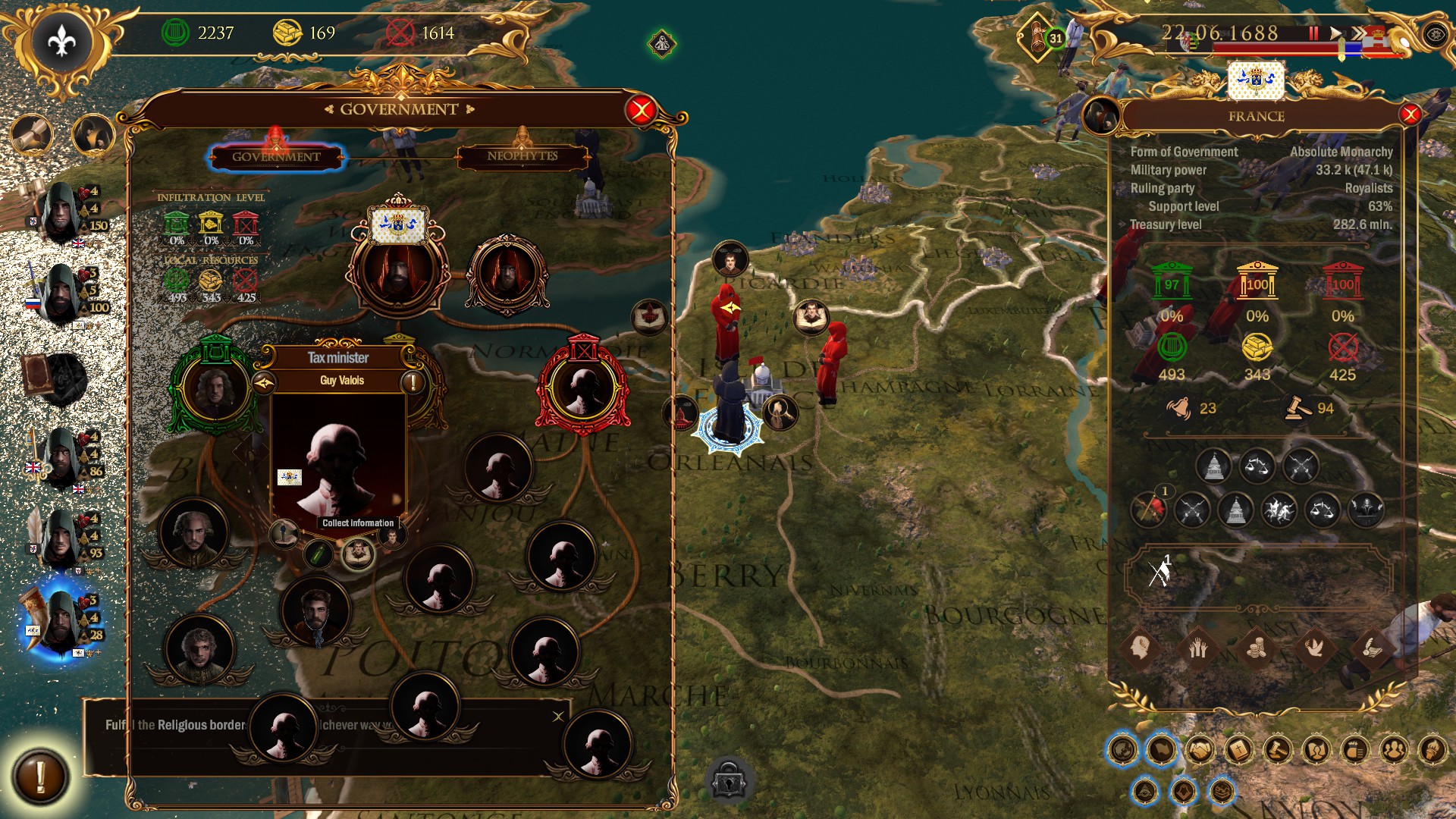
Tutorial and Player Help
The Glorious Revolution campaign (which forms the “plot” part of the previous Fnord review) is the tutorial mode for the game, and while this game definitely needs a tutorial, it doesn’t do so in the best of ways. Primarily, the game locks off many mechanics (shading out most buttons and disallowing their use, or even a tooltip that would tell you what mechanics are missing),
While locking off many aspects of gameplay can be useful for focusing the player’s attention on a small set of basic mechanics before exposing them to more complex mechanics that play off those basic mechanics, Secret Government does so in a manner far too restrictive on the player for too long while letting the rest of the game’s emergent gameplay roll on without letting the player engage with them or even understand what’s going on, making the tutorial far more confusing than instructive.
The best tutorials are a few direct goals that also let you experiment with the mechanics at your own pace. This is why learning from a wiki on a game is generally best for games of such complexity as most Grand Strategy games, as they tend to have interconnected mechanics best explored at a player’s own rate of learning using hyperlinks to go to whichever mechanics the player needs to learn or brush up upon, rather than having everything tossed at them in one go or otherwise taught in a linear fashion with something like a YouTube video.
What makes matters worse is that the game itself is not restricting its complexity while it is restricting how the player can respond. In my game, when the tutorial told me to go expand the lodge into other countries like France, I found France was crawling with enemy agents and an enemy lodge, but all my actions to counterspy or protect my agents were locked out. Worse, the next tutorial objective was terribly vague, and told me to recruit foreign neophytes and then get them into “titles”. I presumed this meant government titles, but it actually meant turning neophytes into masters in the Brotherhood, and while I could find mechanics to get members of a government fired by launching a smear campaign against them, I didn’t find any mechanics for getting my own neophytes posted in their ranks.
During this time, I was hit by my secret society rivals repeatedly when all my tools to fight back were locked off. (In fact, the tools to fight back were only unlocked two or three tutorial goals later.) So basically, I’m told to pursue tutorial goals while ignoring all the other mechanics of the game still going on without me actively stopping me from trying to accomplish the tutorial goals. There’s nothing that seems to really be in place to prevent you from having your mission goals become impossible to complete just because you are under attack and have your agents killed before they can do what the game wants, or if the nation that the game wants you to protect was already wiped out in randomly generated wars before you got to the part of the tutorial where you’re supposed to defend them.
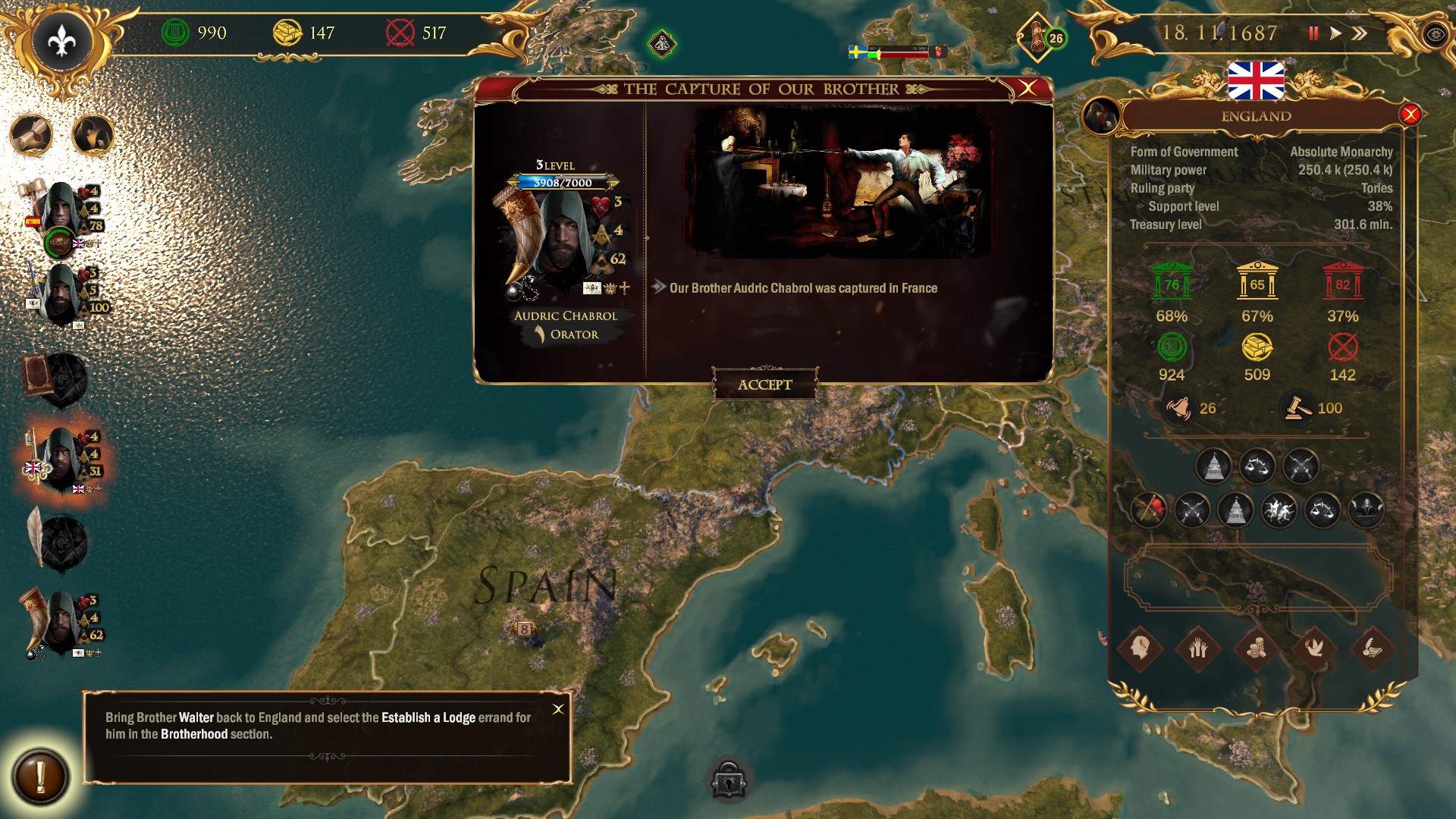
What helped to make this problem of “get a neophyte a title” meaning “make a neophyte a master in the brotherhood menu” is that the tutorial starts off saying that elevating a neophyte to a master is a very unusual thing and that it would be done just this once as an exception because the Brotherhood was so shorthanded. You have ranks in the Brotherhood menu showing Masters at the top (with perks for each one, such as the Orator having a bonus to the loyalty of any neophyte recruited based upon the Orator’s level), then Adepts in the middle, and Neophytes at the bottom. Adepts are the people in positions of power in the governments of the world, while neophytes are the errand boys with no apparent job and the least available actions. Adepts, however, cannot be raised to Master rank, even though the tutorial’s text implies that’s how things should be done. In this tutorial, I’m supposed to surmise that I’m supposed to do something they told me I shouldn’t do based upon extremely vague directions that imply I’m supposed to be messing with entirely different mechanics.
In fact, there is no way to make a neophyte into an adept. Adepts cannot be promoted into masters, either, so apparently the proper order of ranks is adept, then neophyte, then master, because that’s the only progression this game allows, against all sense. When mentioning this on the forums, the developer responded that trying to get one’s own agents appointed to positions of power (especially when the one who makes the appointment is under your control) or trying to influence elections with propaganda in a game about stealthy manipulation is “unrealistic”, and only bringing someone under your influence – even if you are an explicitly pro-Protestant organization and you are talking the Pope into your schemes to undermine Catholicism (yes, you can do this) when they are elected completely without your influence. This means that, in this game supposedly about careful plotting and planning, trying to set up a perfect patsy to be elected into a position of power is not available (or apparently “realistic” for a secret society), but simply matching a person with the right traits and rolling the dice at them for an instantaneous brainwashing of someone with goals diametrically opposed to your society’s, apparently, is.
In general, I find the utter lack of personality or will of agents to be a problem for the game. As soon as you hit them with your percentage chance of persuasion or even intimidation, they lose all will of their own, even if they might have low loyalty. The ideological composition of your secret society doesn’t seem to matter much, everyone follows your arbitrary orders no matter what. They’re less like powerful figures in the shadows and more like mindless zombies. It isn’t exactly rare in strategy games for “your dudes” to be mindless drones, but in a game at least hypothetically about ideological warfare and subtle influence campaigns, you would think the ideology of who works for you should matter, as should the ideology of those who rise to power in some manner more than just a -10% chance to persuade per irreconcilable ideological difference.
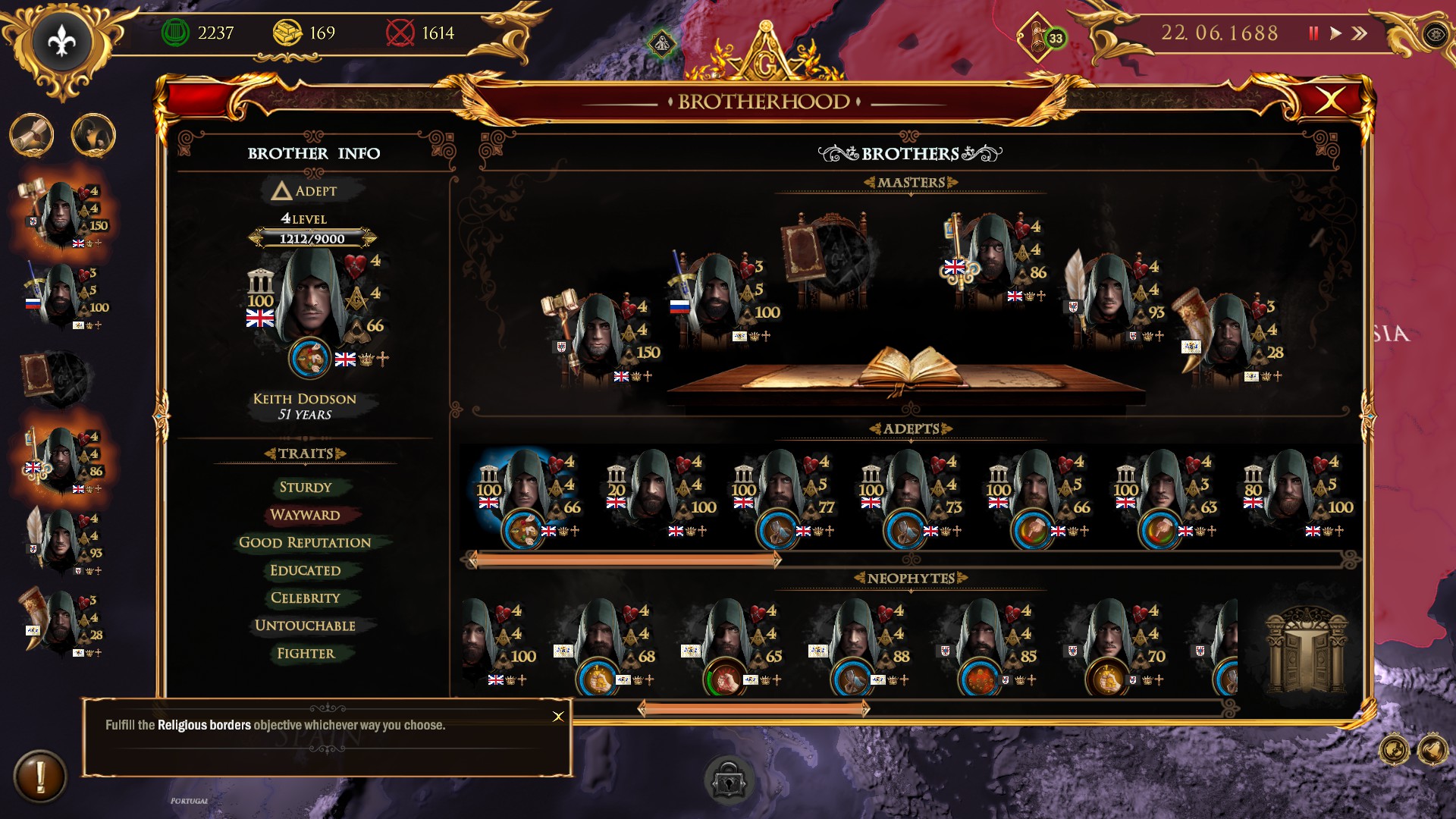
One thing that I find particularly baffling about this arrangement with the tutorial, however, is that the game does have an in-game manual that helps explain many of the game’s features. The only problem is that if you are playing the tutorial, it is also locked off, so you can’t use it. Because why would you confuse players who are new to the game and don’t understand anything by letting them look up what they are confused about and learn something?
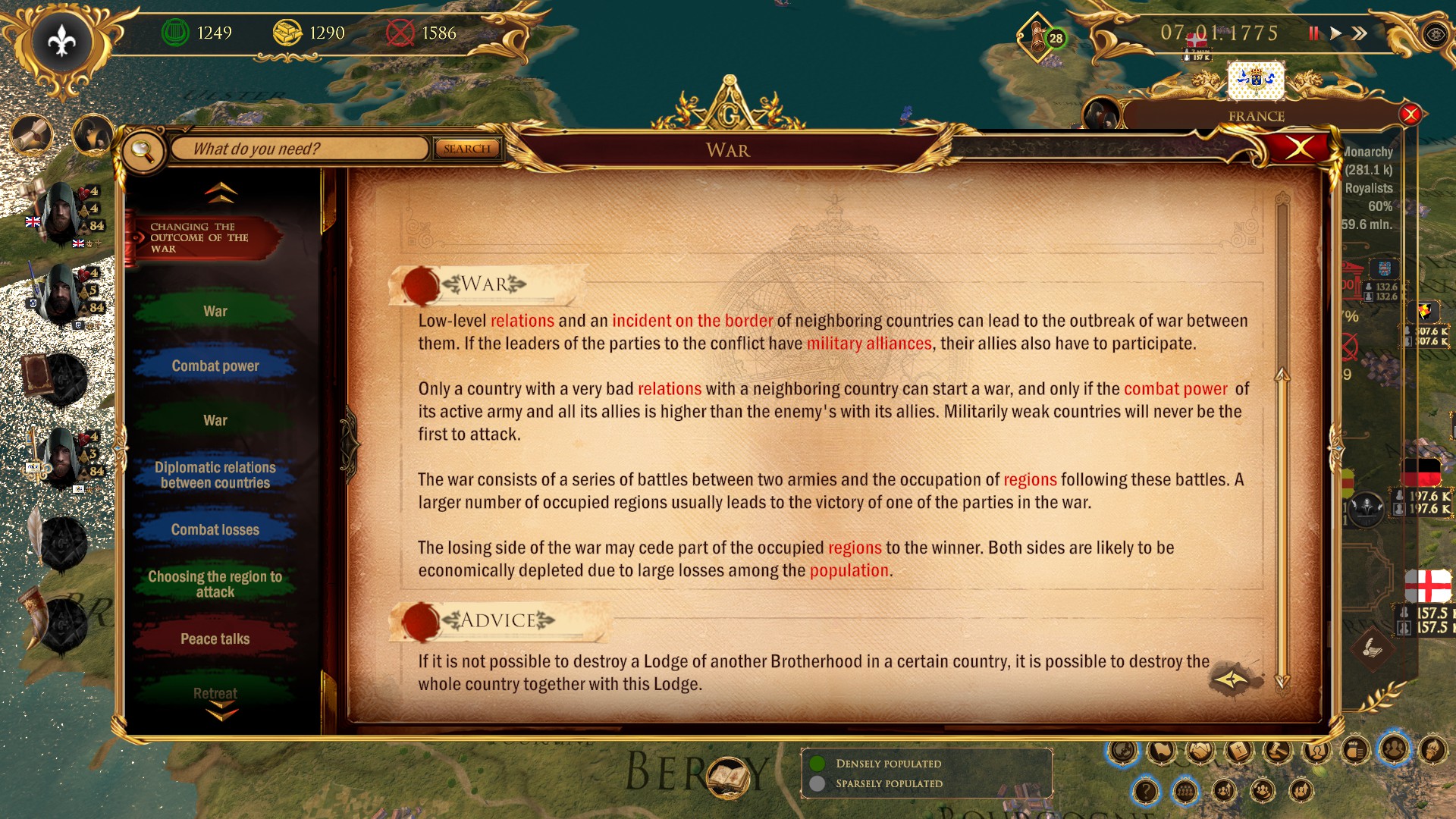
Another issue is that, as of the time of this writing, this game has a wiki that is barely populated with any terms at all. It is only being constructed by someone on the GameTrek or 1C Entertainment staff, as far as I can tell, and it has little hyperlinking and most terms are just definitions of what a term means, rather than explanations of what they do. When I went into the forums to ask a question, it took six days for someone to respond, and that someone was the same company guy working on the wiki, and nobody else had been making posts, either. Hence, it’s safe to say discussion on this game is pretty dead. There are no Steam guides or helpful pages that come up looking for Secret Government on Google. The “Let’s Plays” are out-of-date. If you have trouble understanding how to do something, you’re going to have trouble getting help doing anything other than asking on the forums and hoping for a better-than-one-week response time. Maybe this will improve when the game is fully released, but for now, it is a difficult game to understand with few tools for helping players overcome any problems they have.
Interface
On top of the problems with the names for many components of the game’s mechanics being different from how the missions refer to them, or misleading labels or even outright labeling two different actions the same thing, there are multiple problems with the game’s organization of the information it’s processing.
The masters that are your biggest players tell you what they are doing, and give reports when they accomplish tasks, but adepts and neophytes almost never give reports.
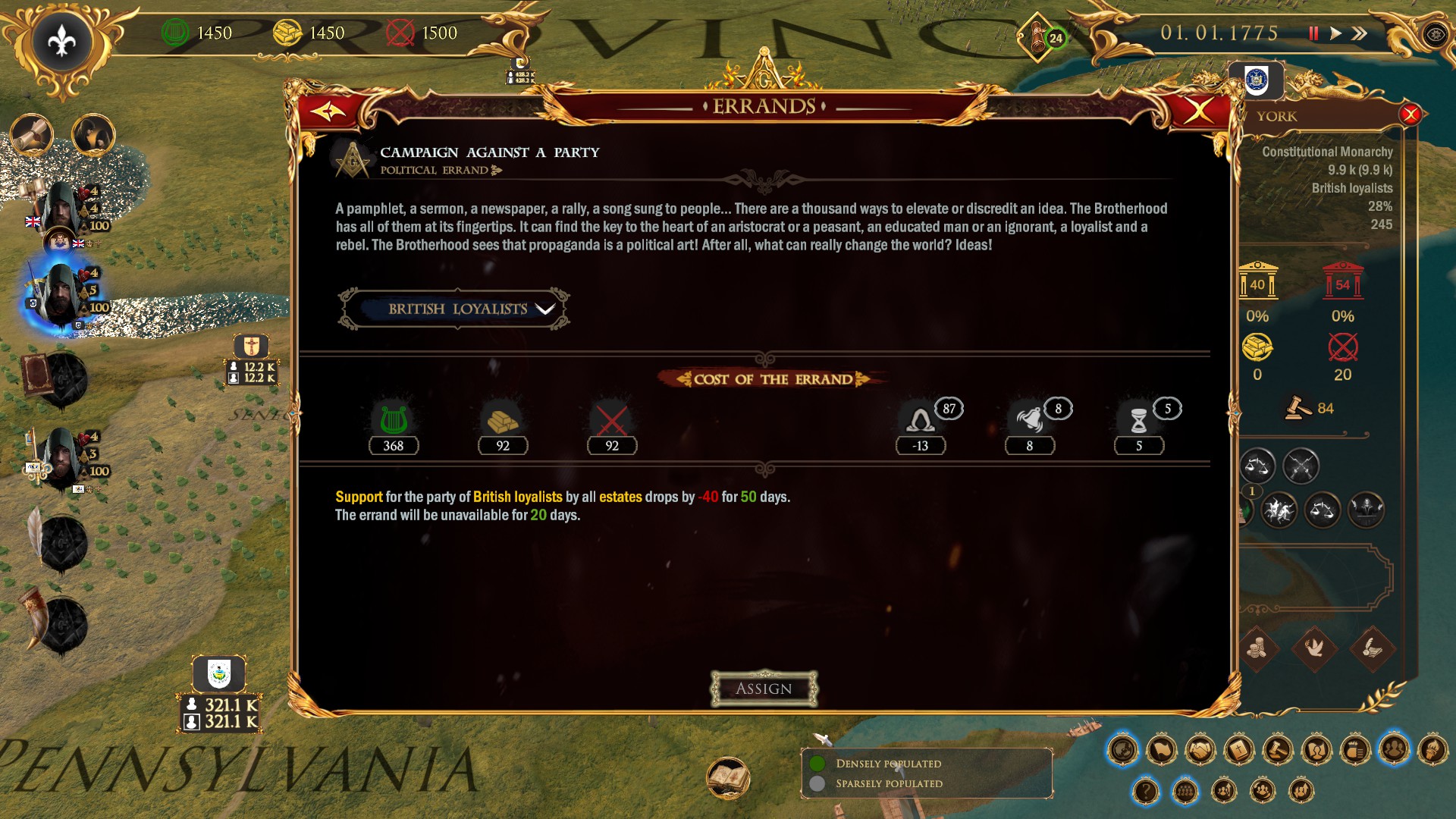
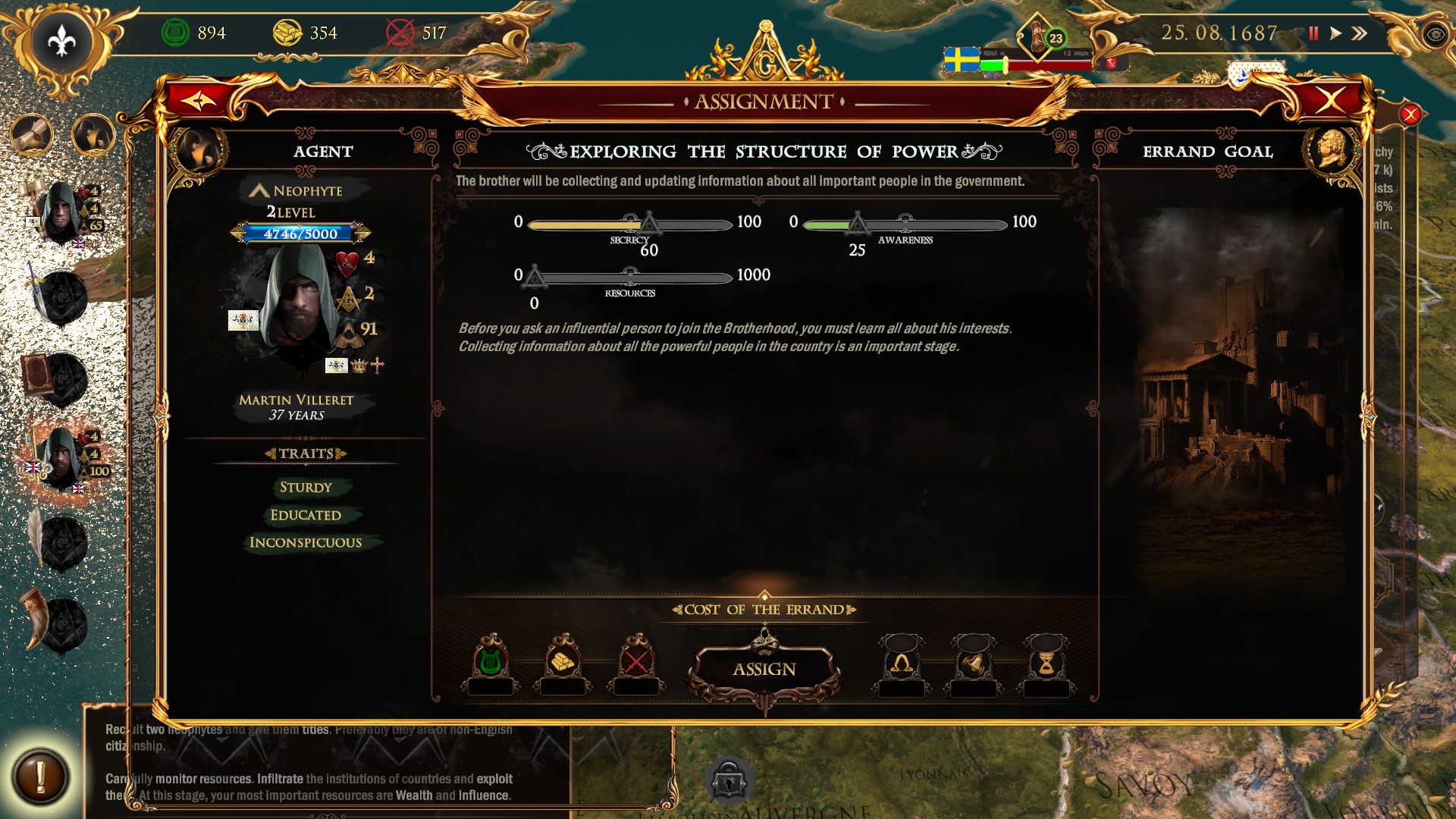
Tasks you assign to adepts and neophytes are open-ended and can involve many different types of specific tasks. In principle, this means you don’t have to micromanage every activity your lower-ranking agents take, but in practice, this is implemented in a terrible way. Your only real control is telling the adepts and neophytes to back off when they blow too much secrecy or raise too much alertness about their activities, but you cannot see what any of their tasks cost, see any hints as to why they aren’t performing their duties when they aren’t performing them, and with open-ended tasks, like recruiting other members of government to the Brotherhood, you can give them no guidance on who to recruit, or see if they have a 0% chance to recruit all remaining members.
Having a micromanagement-free setup where you give broad orders to your agents would be a good idea, but this system just fails to do that. You have to give specific instructions on which resources you need to neophytes, and you also have to give specific instructions to cover traces of brotherhood activity, which are the two main things you want to be doing all the time, but aren’t part of a scripted package you can set your neophytes to follow. You really want to have some commands, like “Search for Signs of Enemy Activity” performed on a schedule of a few months, just to be sure nobody’s trying to sneak into one of your strongholds, but there are no options for that, so it’s just micromanagement.
Similarly to the problem of adepts not giving you reports, you get no report when enemy activities are successful. Enemy agents will try to expose your lodge or agents, putting a nation’s alertness to your activities up past 100%, and bringing about immediate government activities to destroy your lodge, or setting up your agents for assassination or kidnapping… and there’s no warning that this has happened at all except one little number on the side of a character portrait buried in the interface you have to watch at all times. (At least masters are always on the screen, but it’s one of several numbers onscreen at all times, so you have no reason to constantly watch it unless you suspect he will be exposed.)
This is all, however, before we even start talking about the much more complicated aspects of the game, such as Estates.
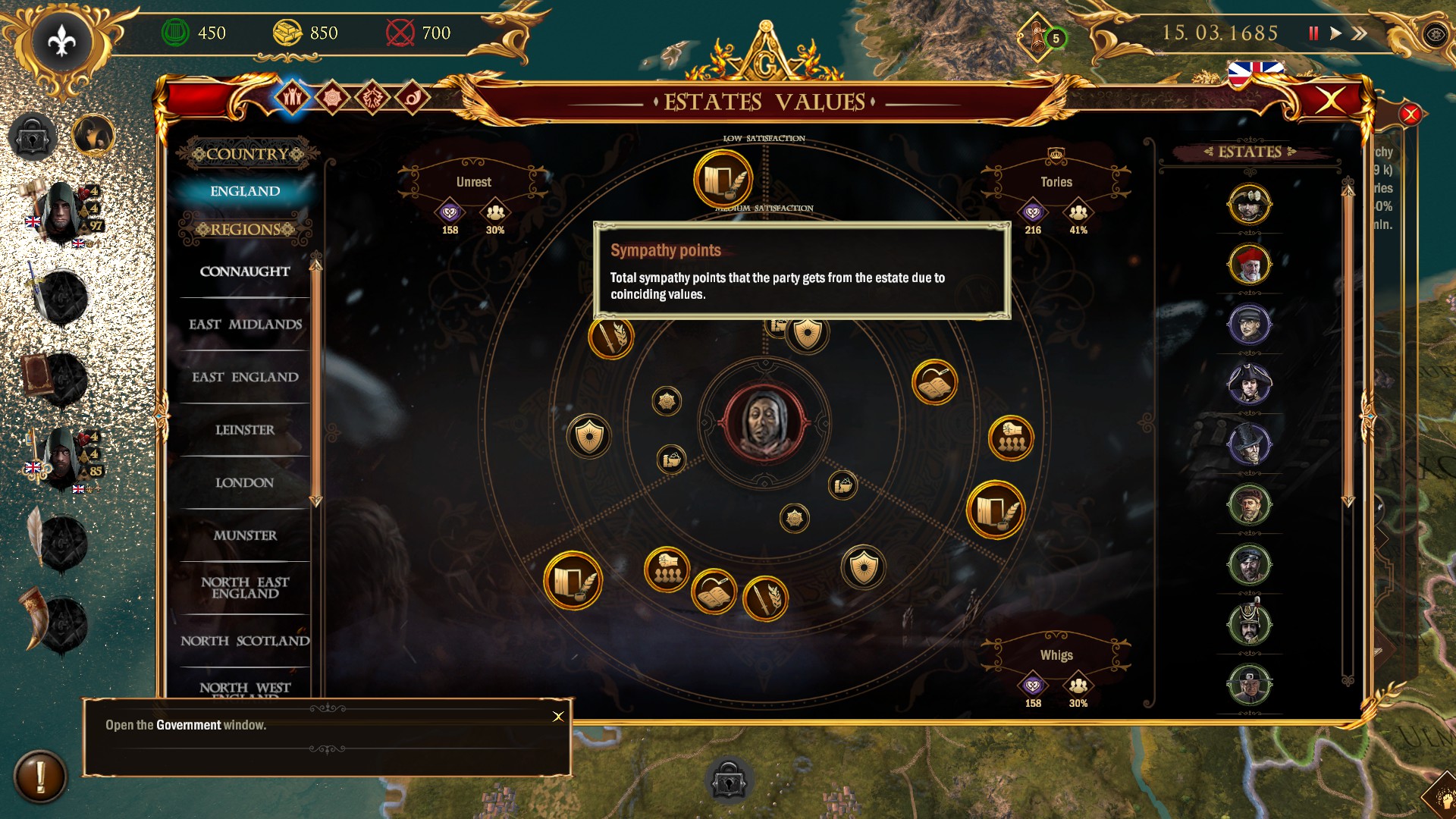
The loading screens and such give you tips about how you need to balance the needs of different estates, such as how soldiers cannot be paid unless the government is solvent, but nearly all of these mechanics involving the tax policy or welfare of the public tend to lie outside what you can either directly see or control, and the way you impact them are far more subtle than the way you perform nearly all your other activities in the game, which are much more direct, like getting money through embezzling from a government. The game warns that you are hurting the economy of a nation by embezzling aggressively, but it can be easier to just go to any rival of a nation and embezzle from them, as well, or just start a war and conquer stuff for more money than to actually manage the economy. Add to this that most campaigns are pretty short (only about 8 years, even though the game runs at around the same speed as Crusader Kings, which goes for nearly 700 years), and there’s far too much subtlety and need for patience for a game that has much more direct objectives for these mechanics to really come into their own, at least as far as I played. (Perhaps in a Freeplay mode, they can be more interesting for self-imposed challenges.)
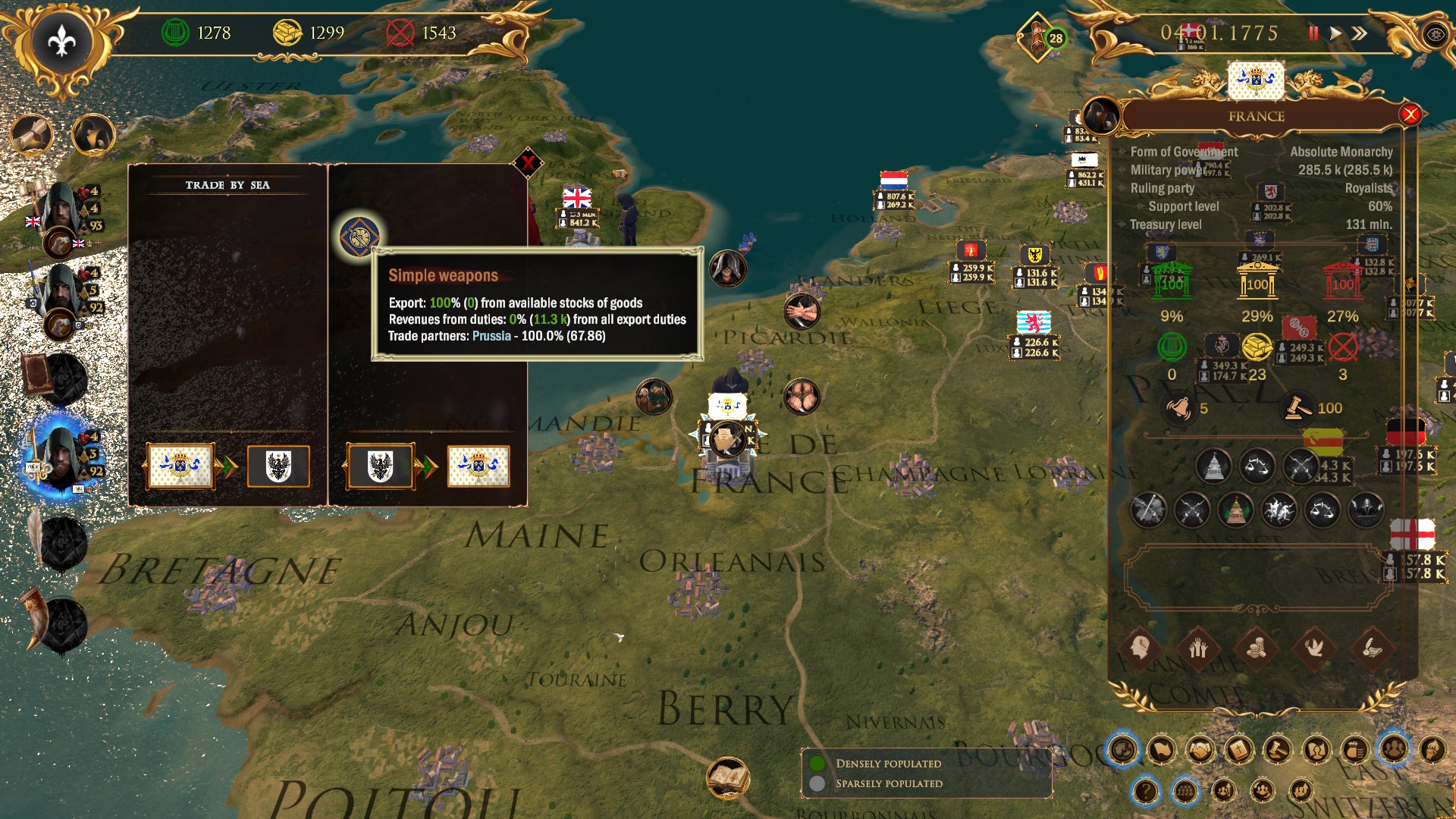
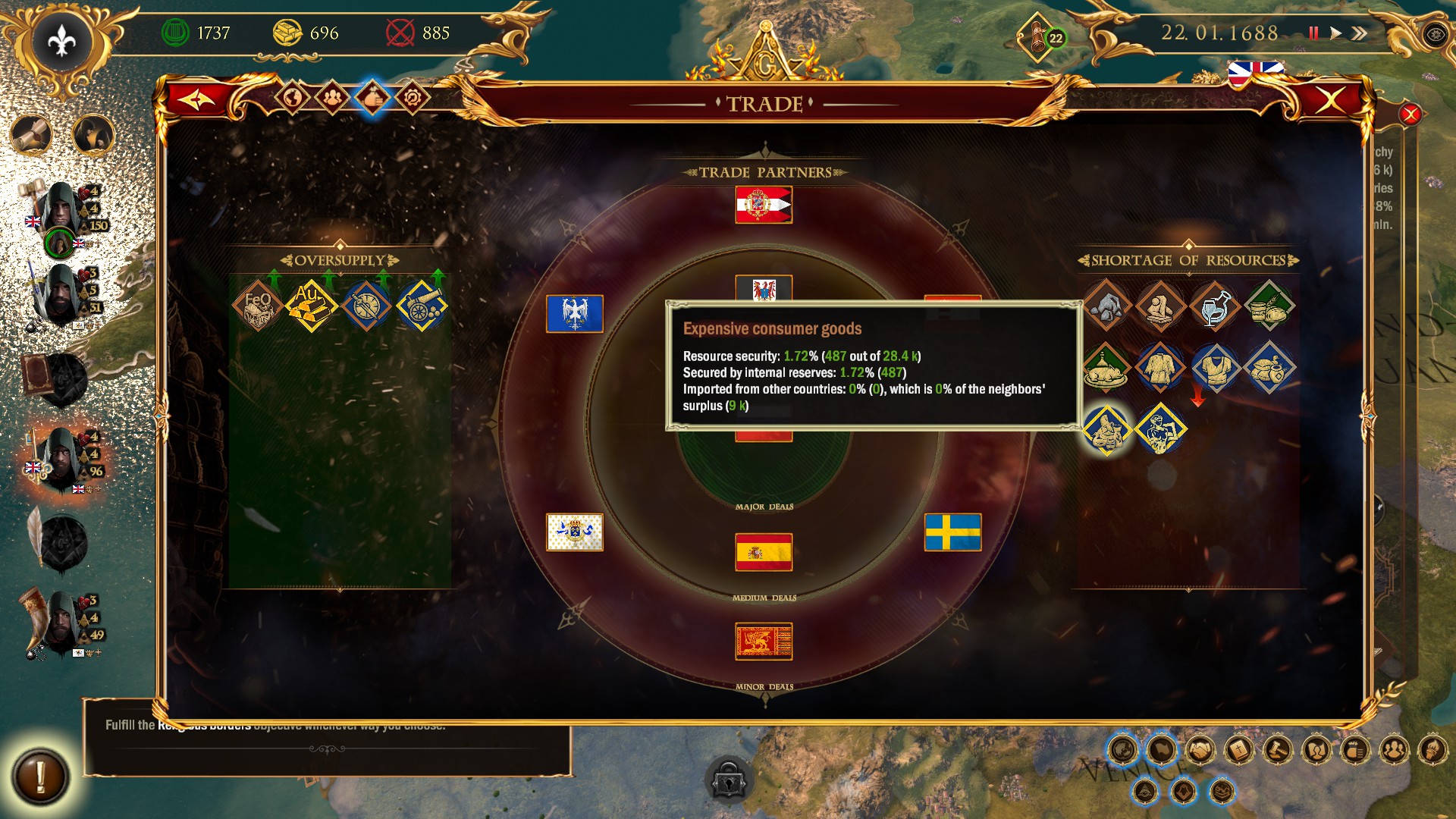
There’s a single icon listing issues at hand for any nation you are infiltrating, but this list of issues almost instantly floods with dozens of issues I usually have no ability to address at any given point in time, anyway, making it nearly useless white noise flooding the screen, and I tend to just ignore it to the point that I forget to check when it does have information I need to act upon.
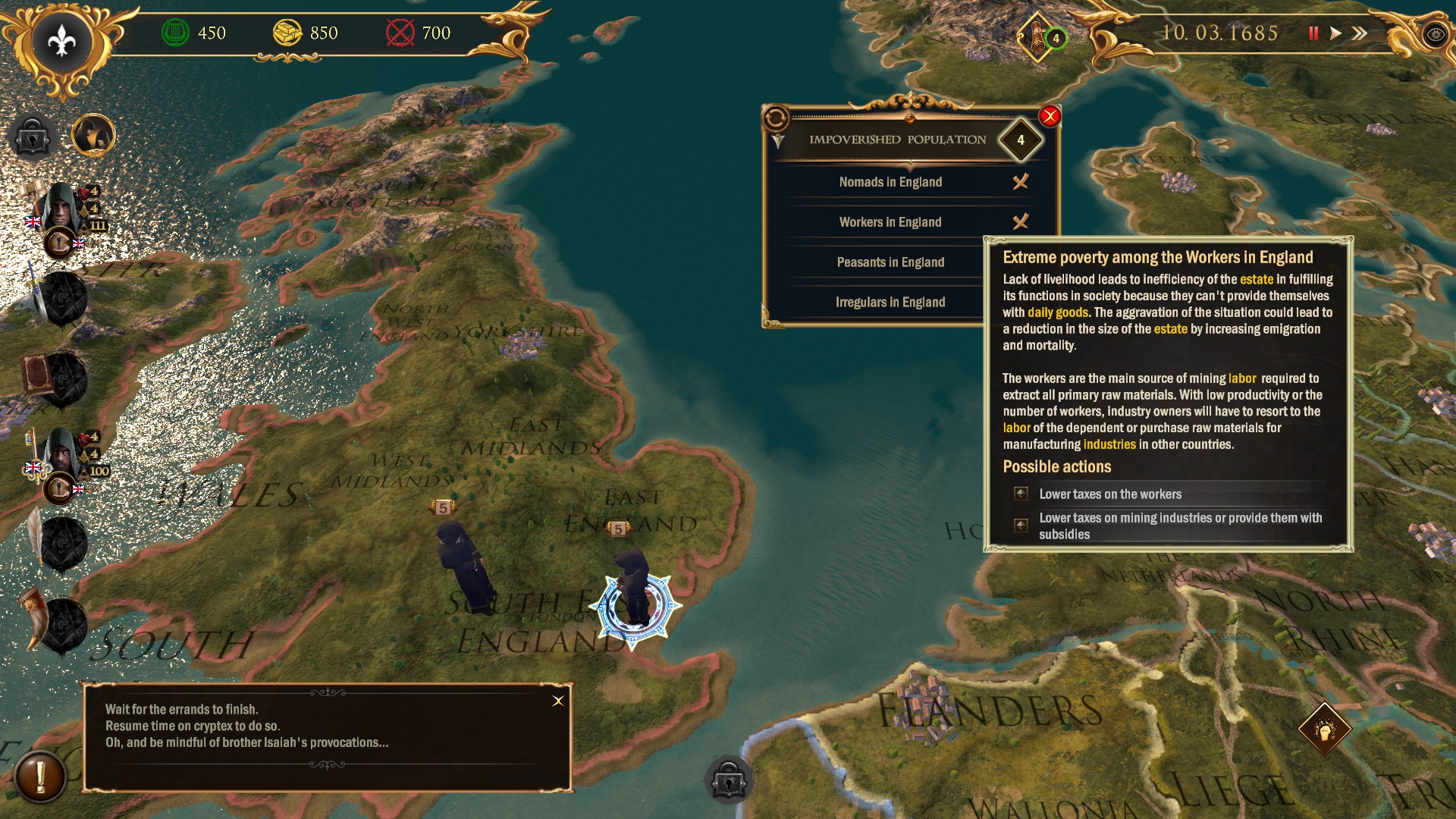
The end result is that this is a game where most of the game is playing itself in the background while you’re nearly totally unaware of everything but the most immediate actions of your Brotherhood’s agents. Even if you want to keep apprised of the state of the economy in several different nations, each one’s status is buried under multiple layers of spreadsheets that make tracking anything over the course of the game a nightmare.
Bugs
The game’s loading screen straight-up tells you to hit Ctrl-F11 to document bugs and report them because they expect you to run across many of them. So far as game crashes go, however, I didn’t experience any game-ending bugs, and one of the things listed in the improvements with the new update was performance, and my (fairly middle-range) computer had no real trouble running the game.
The problems of interface and tutorial opacity, however, meant that I was at times left unable to determine whether I was actually facing a bug or just didn’t understand the game’s mechanics. For example, when you do not have information on every member of a government, then aside from the “collect information” a master can perform, you can send a neophyte to “explore the structure of power”. This even shows the government power tree, so it should reveal information on those in power, right? Well, it does nothing. I have never seen this task do anything. I think it’s a bug, but I can’t be sure because there is no instruction on how it’s supposed to work, so maybe I’m just not fulfilling some esoteric condition.
That said, I did manage to find some definitely real bugs that were nevertheless difficult to notice straight away. For example, my efforts to infiltrate the whole government of England were stymied when I had to use the order to dig up dirt on the people who refused to join my cause so I could replace them in government with people I could bring around to my side because the “Compromising Officials” task I used to try to get some stubborn officials like the business magnate out of power turned out to not care whether they were targeting the people I wanted out of power, or their own fellow Brotherhood members, leading to a cycle of getting my own agents fired and having to re-recruit their replacements again. What makes this worse is that there is no indication (except watching the government page for that one specific country) to see why my own adepts were dropping in government confidence until they got fired, because there is no feedback on the tasks that adepts take.
Verdict
Secret Government has the capability to become a very interesting game. The issues of a bad interface and a bad tutorial are serious hurdles to most people being able to see the good parts this game has beyond those barriers to entry, and the game needs a serious rethink on how much it will allow more blunt and direct methods like just straight recruiting the Pope to help you in your campaign against Catholocism to make its more subtle gameplay elements have room to matter. These are, however, problems within the domain of what is changeable without a total overhaul of the game, unlike issues like fundamental game mechanics being at odds with one another, so there is room to hope that some of these issues can be addressed.

